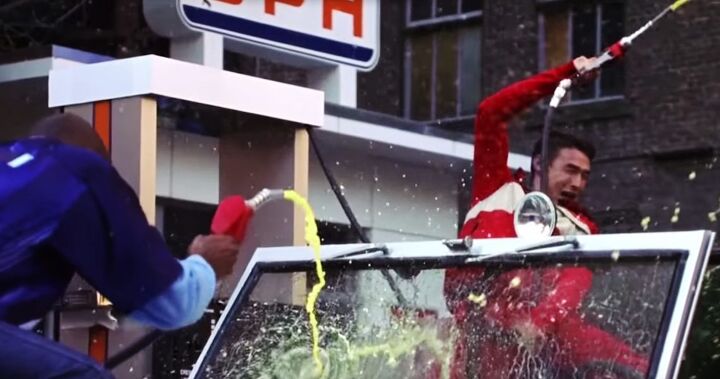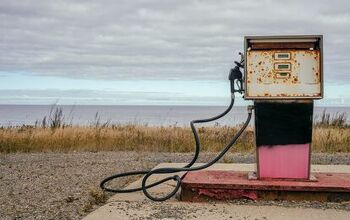Gas Fight! States Suing Trump Administration Over Stalled Fuel Economy Fines

A handful of states have banded together to sue the Trump Administration for delaying financial penalties associated with automakers’ inability to meet minimum fuel economy standards. As part of the president’s deregulation proposals, the National Highway Traffic Safety Administration has placed Obama-era mandates on review as regulators debate whether to grant automakers significant reductions in fuel economy requirements.
However, those changes have yet to arrive, meaning the industry is still under pre-existing standards — and some states want automakers held accountable. California, New York, Vermont, Maryland, and Pennsylvania want the current administration to introduce its proposed quotas or enforce the already established 2016 limits.
Having reviewed a copy of the suit ahead of its filing in the U.S. Court of Appeals, Reuters notes that the states and three environmental groups are jointly challenging the National Highway Traffic Safety Administration’s July decision to suspend a 2016 directive that more than doubled penalties.
In 2015, Congress ordered federal agencies to adjust civil penalties to account for inflation. In response, the NHTSA proposed to raise fines from $5.50 to $14 for every 0.1 mile per gallon of fuel that newly built vehicles consume in excess of Corporate Average Fuel Economy (CAFE) standards.
“State attorneys general have made clear: we won’t hesitate to act when those we serve are put at risk,” New York Attorney General Eric Schneiderman said in an official statement.
Automakers immediately protested the hike, claiming it could increase industry compliance costs by around $1 billion annually. Likewise, chief executives of 18 carmakers issued memorandums to both the president and Trump-appointed EPA administrator Scott Pruitt at the start of this year. The letters urged officials to relax efficiency and emissions standards, despite manufactures having already agreed to the previous terms while Obama was in office.
In March, Trump ordered a comprehensive review of the vehicle fuel efficiency standards from 2022 through 2025, saying they were too strict and might handicap productivity.
The NHTSA said in July that many automakers were already falling behind the current fuel economy standards and could be faced with “the possibility of paying larger CAFE penalties over the next several years.” While it cited that figure as $30 million in annual civil penalties, automakers claim it could be much higher. Automakers have also mentioned the possibility of increased costs to consumers and a production decline that could end up “putting hundreds of thousands and perhaps as many a million jobs at risk.”
It’s hard to know which group to listen to — each has its own agenda to push in the gasoline fight. The Obama administration wanted an environmental victory, Trump wants a business win, states want a well-stocked U.S. Treasury, and automakers want to remain as profitable as possible with minimal oversight.
Of course, the backdrop to all of this is doing what’s best for the planet.
California Attorney General Xavier Becerra said in a statement that gas-sipping cars mean “cleaner air, better overall health for our children, and savings at the pump… We will hold the Trump Administration accountable.”
The litigants’ fear is that companies won’t bother with emissions without government intervention. Conservatives say over-regulation is detrimental to the health of the automotive industry. Meanwhile, Liberals are convinced business will take advantage of the environment the second efficiency standards are rolled back.
To play devil’s advocate, I’ll remind everyone (for the third time this week) that practical fuel economy hasn’t changed since 2014. Meanwhile, the public hasn’t embraced ultra-green vehicles to the degree proponents hoped for. But more than 700,000 jobs have been added in the automotive sector since the government bailed out the auto industry, and plenty of them are due to parts suppliers focusing on efficient vehicle technologies.
[Image: Paramount Pictures]

A staunch consumer advocate tracking industry trends and regulation. Before joining TTAC, Matt spent a decade working for marketing and research firms based in NYC. Clients included several of the world’s largest automakers, global tire brands, and aftermarket part suppliers. Dissatisfied with the corporate world and resentful of having to wear suits everyday, he pivoted to writing about cars. Since then, that man has become an ardent supporter of the right-to-repair movement, been interviewed on the auto industry by national radio broadcasts, driven more rental cars than anyone ever should, participated in amateur rallying events, and received the requisite minimum training as sanctioned by the SCCA. Handy with a wrench, Matt grew up surrounded by Detroit auto workers and managed to get a pizza delivery job before he was legally eligible. He later found himself driving box trucks through Manhattan, guaranteeing future sympathy for actual truckers. He continues to conduct research pertaining to the automotive sector as an independent contractor and has since moved back to his native Michigan, closer to where the cars are born. A contrarian, Matt claims to prefer understeer — stating that front and all-wheel drive vehicles cater best to his driving style.
More by Matt Posky
Latest Car Reviews
Read moreLatest Product Reviews
Read moreRecent Comments
- Dave M. IMO this was the last of the solidly built MBs. Yes, they had the environmentally friendly disintegrating wiring harness, but besides that the mechanicals are pretty solid. I just bought my "forever" car (last new daily driver that'll ease me into retirement), but a 2015-16 E Class sedan is on my bucket list for future purchase. Beautiful design....
- Rochester After years of self-driving being in the news, I still don't understand the psychology behind it. Not only don't I want this, but I find the idea absurd.
- Douglas This timeframe of Mercedes has the self-disintegrating engine wiring harness. Not just the W124, but all of them from the early 90's. Only way to properly fix it is to replace it, which I understand to be difficult to find a new one/do it/pay for. Maybe others have actual experience with doing so and can give better hope. On top of that, it's a NH car with "a little bit of rust", which means to about anyone else in the USA it is probably the rustiest W124 they have ever seen. This is probably a $3000 car on a good day.
- Formula m How many Hyundai and Kia’s do not have the original engine block it left the factory with 10yrs prior?
- 1995 SC I will say that year 29 has been a little spendy on my car (Motor Mounts, Injectors and a Supercharger Service since it had to come off for the injectors, ABS Pump and the tool to cycle the valves to bleed the system, Front Calipers, rear pinion seal, transmission service with a new pan that has a drain, a gaggle of capacitors to fix the ride control module and a replacement amplifier for the stereo. Still needs an exhaust manifold gasket. The front end got serviced in year 28. On the plus side blank cassettes are increasingly easy to find so I have a solid collection of 90 minute playlists.


































Comments
Join the conversation
Five liberal states are upset the Executive branch is picking and choosing laws it wants to enforce, and they don't like it. Were they asleep during 8 years of Obama, a president who made this practice fashionable? Dear 5 states, tell me your stance on sanctuary cities.
• "To play devil’s advocate, I’ll remind everyone (for the third time this week) that practical fuel economy hasn’t changed since 2014." ---- But note also that in 2014 those vehicles were already meeting 2019 or 2020 standards according to some reports. • "Meanwhile, the public hasn’t embraced ultra-green vehicles to the degree proponents hoped for." ---- Maybe not to the levels hoped, but there are still several hundred thousand BEVs on the road that weren't there seven years ago (on a global basis) and on average the total number continues to grow, albeit slowly. The slowdown this year has been mostly an anticipatory one for the Bolt and the Tesla Model 3, while others stand to hit the market as soon as next year, raising the potential market to new levels while making some more affordable to the people who really are the ones needing to make the switch. Up to now, the only longer-range models have been priced out of the general consumer market.